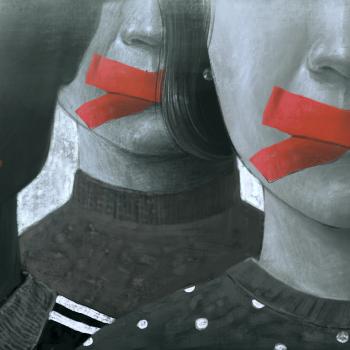Connor Wood
 Last week, columnist and blogger Rod Dreher at the paleoconservative magazine The American Conservative got wind of my Patheos post claiming that religion and creativity are anti-correlated. His take on the idea, and the blog post that resulted, kicked off a very spirited debate among commenters. Many of the ideas were similar to the critiques my original article received: there have been plenty of religious artists throughout history; the creativity/religion dichotomy is a product of modern secular culture (Dreher’s position); the whole claim hangs on a mistaken definition of creativity. And of course, many readers agreed with the original thesis, expressing that they recognized their own struggles to meld creativity and meaning in their lives. I’d tried to respond to some of these critiques previously, in a follow-up post to the original, and Dreher kindly also devoted another post of his to my follow-up. (Update: Andrew Sullivan at The Dish also just weighed in.) The conversation was fascinating, and I encourage you to check it out. But are religion and culture really the enemies of creativity?
Last week, columnist and blogger Rod Dreher at the paleoconservative magazine The American Conservative got wind of my Patheos post claiming that religion and creativity are anti-correlated. His take on the idea, and the blog post that resulted, kicked off a very spirited debate among commenters. Many of the ideas were similar to the critiques my original article received: there have been plenty of religious artists throughout history; the creativity/religion dichotomy is a product of modern secular culture (Dreher’s position); the whole claim hangs on a mistaken definition of creativity. And of course, many readers agreed with the original thesis, expressing that they recognized their own struggles to meld creativity and meaning in their lives. I’d tried to respond to some of these critiques previously, in a follow-up post to the original, and Dreher kindly also devoted another post of his to my follow-up. (Update: Andrew Sullivan at The Dish also just weighed in.) The conversation was fascinating, and I encourage you to check it out. But are religion and culture really the enemies of creativity?
The American Conservative is a venue for ideas about traditionalism, Burkean political philosophy, and Wendell Berry-style advocacy of small communities and religious continuity. The magazine was formed as a conservative voice of opposition to the Iraq War during the second Bush presidency. Its readers and contributors tend to feel a healthy disrespect for the individualism, consumerism, and the supposed nihilism of modern society, and there’s something of a misty nostalgia for previous, bygone eras in which everyone agreed on the basic propositions of life: who the creator of the universe was, what humankind’s ultimate destiny might be, and so forth. Modernity, with its cacophony of diverse opinions, offers no basic metaphysical agreements, and so the culture is fractured. As you might expect, then, quite a few of Dreher’s readers argued that the religion/creativity divide is the product of the mistaken assumptions of modernity. For example, commenter Franklin Evans claims that
There is a mistake underlying Wood’s assertions. We can speculate (not having been there) that the Apollonian-Dionysian divide was in fact a dynamic tension, not one of conflict as in a tug-o’-war. They were co-existent, and “fed” off each other in important ways. Homer and the dramatists showed this dynamism in their storytelling. My favorite examples come from Eurypides…
And Dreher says something similar in his initial post on the subject:
The extent to which creativity and the religious sense diverge, and find themselves in opposition, is a function of the secular age, in Charles Taylor’s meaning (= a time and place in which people generally understand that religion is experienced by most people not as an objective reality, but a subjective choice). In past centuries, even creative people pretty much shared the wider society’s metaphysical and religious assumptions. …Secular modernity, especially in this century, changed all that.
Dreher and many commenters believe that a shared web of religious and cosmological beliefs within a society can actually shape, channel, and inform creativity rather than stamping it out. Dreher writes in another post, inspired by the same topic:
It seems to me that good storytelling comes out of a culture that has an implicit sense of order, both visible and invisible, against which characters can clash. Drama emerges from this.
In many ways, I am actually inclined to agree with these interpretations. I do think the extreme polarization between creative expression and religious or communal solidarity – that is, stability – is unhealthy. In fact, a painful awareness of just how unhealthy that divide can be drove me to write the original essay. But I’m also not sure that the past was some sort of Golden Era in which creativity and religiosity bled seamlessly into one another, and religious creed inspired and fed creative passion rather than suppressing it. It seems likely to me that societies in all places and times have likely featured a spread of personalities, with some people preferring order and stability, and some people craving novelty and stimulation. These two basic orientations are described in today’s psychological literature as the personality traits of conscientiousness and openness to experience, respectively. Even in ancient Greece, with its integrated worldview, some people probably felt more comfortable nestled in the bosom of culture and routine, while others felt called to explore new horizons. There may have been less tension between these two types back then, but there was almost certainly a difference.
Keep in mind that nearly all the psychological research on personality has been done since the mid-20th century, and the vast majority of it has focused on Americans and Europeans. So I’m taking a bit of a risk by claiming that two personality types are universals across time and geography. However, ethologists – scientists who study animal behavior – have long agreed that individual animals within species vary according to how shy or bold they are, or how willing they are to investigate novel phenomena and take risks. This is a fairly stable distinction, found in animals as diverse as guppies, wolves, and geese. Some individuals are just born more risk-averse, and less stimulation-seeking, than others. I don’t see any reason to think this same distinction does not also apply to humans – since we are, last time I checked, animals, part of the fabric of the biological world.
So it seems very likely (to me, anyway) that even in the most integrated, holistic community, where everyone shares the same basic cosmological assumptions, some people are going to be more willing to rock the boat and generate new ideas than others. This was true in ancient Greece, medieval Europe, and modern America. Maybe the most important difference is that, in the more traditional, intact cultures, the novelty-seeking folks and creative types are better able stay integrated with the society even as they strike out for new intellectual and artistic territory. In a large-scale, cosmopolitan culture like our own, novelty-seekers don’t necessarily have an intact web of culture to keep them engaged, and so they’re in danger of drifting into real social isolation. Severed from the webbing of culture, they may be more likely to fall victim to the kinds of self-destructive behavior that tightly-knit communities tend to work against: alcoholism, drug abuse, reading Charles Bukowski, and so forth.
So in some ways I agree with Dreher’s take on the question, and in another way I think he and many commenters underestimate the extent to which a tension between newness and tradition, between creative expression and social fabric, is probably universal. At the same time, I think it would be awesome to live in a world where these two poles could be, as Franklin Evans puts it, in “dynamic tension” rather in in out-and-out war.











